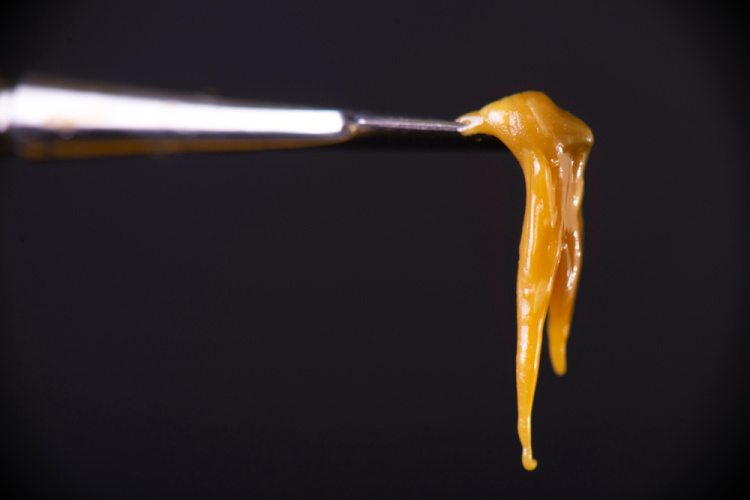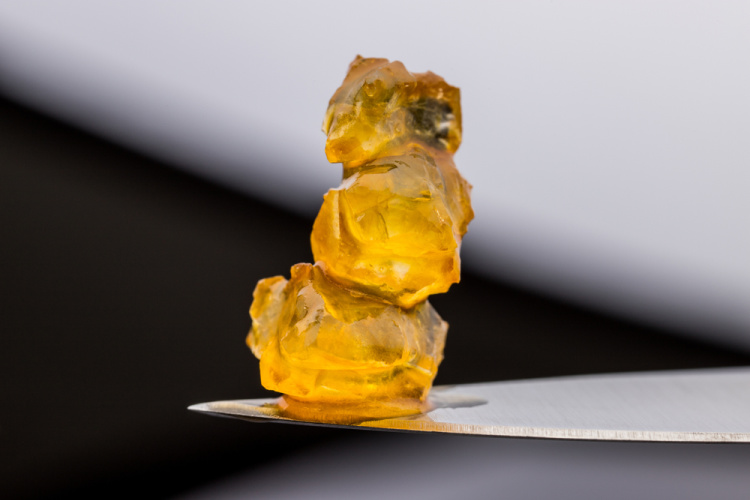If you’ve visited any of our family of dispensaries, you’ve probably seen products with names like badder, budder, resin, rosin, and others. Confused? Don’t worry—you’re not the only one!
These products are all examples of concentrates, the newest and arguably most exciting class of cannabis products available today. And because they come in so many styles (and go by so many different names), they can be hard to get a handle on.
Some of the most popular concentrates we sell at our dispensaries are rosin and resin, and while they may sound alike they’re actually two very different products. Sit tight as we dig into the resin vs rosin debate, and why you might want to pick one or the other for specific potencies, flavors, and outcomes.
Ready? Let’s get rolling!
Understanding Concentrates and Extraction Methods
If you’re new to dabbing—that is, inhaling cannabis concentrates through a specialized glass pipe—browsing a list of cannabis concentrates can leave you with more questions than answers. With so many concentrates to choose from, and with so many small subtle differences between them, it can be easy to quickly get lost.
Here’s are a couple of ways we’ve found to help our customers get up to speed quickly. At the simplest level, a cannabis concentrate is a cannabis product that concentrates the extracted cannabinoids—that is, the “active ingredients” like THC and CBD—into a highly potent and shelf-stable format.
Breaking it down a bit further, concentrates can be classified as solvent-based and solventless products. Solvent-based concentrates use chemical processes—typically with a solvent such as CO2 or butane—to extract and concentrate those cannabinoids. Some examples are the cannabis distillates that power most vape pens or the high-potency wax and shatter used in dab rigs.
Solventless concentrates rely only on heat and mechanical processes instead. Examples include kief—or dried, powdery cannabis trichomes—and rosin, a concentrate so simple and safe it can be produced at home.
Is one better than the other? While some consumers gravitate to solventless concentrates because they prefer products that haven’t been chemically processed, the truth is that well-made concentrates like the ones we stock are expertly made, with all the solvents purged before sale (and tested for purity and safety).
With that said, let’s dive deeper into the difference between resin and rosin.
What Is Resin?
While the term resin can also refer to the gooey substance produced by trichomes found on fresh, high-quality cannabis flower, when it comes to concentrates resin refers to a solvent-based concentrate using a hydrocarbon or CO2 extraction process. Resin concentrates look very similar to wax, but they tend to be a bit more sticky, gooey, and runny.
You may have also heard of the highly popular variety of resin called “live resin.” This concentrate is made by freezing freshly harvested plant material until it’s ready to be extracted. By freezing the material right away, a higher level of terpenes are preserved, making the final product far more flavorful and aromatic than even the freshest cannabis flower. Live resin is super aromatic and can fill up a room with its scent as soon as it’s opened. Because it’s somewhat liquid and saucelike, it’s nearly always consumed with a dab rig.
What Is Rosin?
Cannabis rosin is a thick, sticky cannabis concentrate produced by a simple, solventless extraction process. It’s made by pressing cannabis plant material under gentle heat to squeeze out the active terpenes and cannabinoids.
And when freshly harvested cannabis is flash-frozen and then pressed, you end up with live rosin. Somewhat more solid and hefty than the sauce-like live resin, some feel live rosin also more nuanced in flavor. Like live resin, when compared with flower it packs an impressive terpene content and the intense flavors that go with them.
Resin vs Rosin: Which Is Better?
Many of our customers ask: which is better, rosin or resin? Frankly, it’s a matter of choice. From a subjective standpoint, each delivers impressive potency—sometimes approaching 90% THC content. By way of comparison, the strongest flower tops out around 30%. You can see why a little concentrate goes a long way—and why we advise newcomers to “start low and go slow” with these very potent products.

Flavorwise, some people prefer the smooth nuance of rosin and live rosin, while others prefer the brasher, more in-your-face flavor profile of resin and live resin. In terms of cost, rosin tends to be more expensive as it’s more labor-intensive to produce.
Tips for Enjoying Resin and Rosin
As we referenced earlier, rosin and resin are typically consumed via a dab rig, a specialized glass pipe made for consuming—“dabbing”—cannabis concentrates. They’re something of an investment, but if you’re interested in exploring the world of cannabis concentrates, an essential piece of equipment.
When it comes to storing rosin and resin, remember that light, exposure to air, and extreme temperature shifts are the enemies of fresh cannabis products. Keep your products in a dark location or lightproof jar that seals, and store them at room temperature. The only exception here is possibly the saucelike and liquid live resin. In this case, many sources recommend storing it in the refrigerator (or even frozen) to maintain peak freshness.
Shop Resin and Rosin at Your Local Green Goods
We hope today’s post has clarified rosin vs resin debate, and why you might want to choose one (or both) of these cannabis concentrates. Both rosin and resin offer nuanced flavor experiences than other cannabis products out there, with rosin being a little more mellow and resin offering a more in-your-face experience. Rosin tends to be a stiffer and more hefty consistency than resin, and both can be enjoyed in a dab rig to really appreciate the flavors and aromas.

If you’re interested in trying rosin or resin for yourself, we can help with that! As one of the nation’s favorite families of dispensaries, we pride ourselves on offering an exceptional range of cannabis concentrates, great customer service, and the kind of reliable cannabis knowledge that helps our customers make wise, well-informed buying decisions. Just navigate to the location closest to you and check the live menu to see what’s fresh, hot, and in stock today!
If you have any other questions about cannabis concentrates or any other topics, just drop us a line. We’re always here to help.
Qualifying conditions vary by state. Any information related to qualifying conditions in this post may not apply to cannabis patients in all states. Product availability also varies based on state program restrictions and rules, so the products discussed may not be available in all states. Check with your local Green Goods location about the products available in your state.
